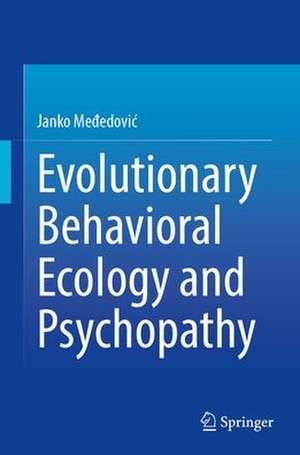Evolutionary Behavioral Ecology and Psychopathy
Autor Janko Međedovićen Limba Engleză Hardback – 21 iul 2023
•Basic concepts of evolutionary biology
•Evolutionary behavioral sciences
•Evolutionary ecology of family
•Evolutionary tradeoffs
•Life history theory
•Behavioral ecology of personality
•Psychopathy and its current evolution.
The second part of the book describes empirical research on psychopathy in evolutionary ecological context, aiming to explore fertility-longevity tradeoffs in psychopathy, interacting phenotypes in psychopathy, and parental effects associated with psychopathy. This part contains the discussion of the study’s findings which is based on several theoretical concepts described in part one.
This volume is ideal for psychopathy researchers hoping to bridge the natural and social sciences in a new and innovative way.
Preț: 727.80 lei
Preț vechi: 887.55 lei
-18% Nou
Puncte Express: 1092
Preț estimativ în valută:
139.26€ • 145.41$ • 114.100£
139.26€ • 145.41$ • 114.100£
Carte tipărită la comandă
Livrare economică 15-29 aprilie
Preluare comenzi: 021 569.72.76
Specificații
ISBN-13: 9783031328855
ISBN-10: 303132885X
Pagini: 184
Ilustrații: VIII, 184 p. 9 illus. in color.
Dimensiuni: 155 x 235 mm
Greutate: 0.45 kg
Ediția:2023
Editura: Springer Nature Switzerland
Colecția Springer
Locul publicării:Cham, Switzerland
ISBN-10: 303132885X
Pagini: 184
Ilustrații: VIII, 184 p. 9 illus. in color.
Dimensiuni: 155 x 235 mm
Greutate: 0.45 kg
Ediția:2023
Editura: Springer Nature Switzerland
Colecția Springer
Locul publicării:Cham, Switzerland
Cuprins
Chapter 1 Basic concepts of Evolutionary Biology.- Chapter 2 Evolutionary of Behavioral Sciences.- Chapter 3 Evolutionary Ecology of Family.- Chapter 4 Evolutionary Tradeoffs in Human.- Chapter 5 Life History Theory.- Chapter 6 Behavioral Ecology of Personality.- Chapter 7 Psychopathy and its Current Evolution.- Chapter 8 The Empirical Study: Psychopathy, Fertility, Longevity, Interacting Phenotypes, and Parental effects.
Notă biografică
Janko Međedović holds a PhD in psychology and works as a senior research associate in Institute of criminological and sociological research; furthermore, he leads the courses Psychology of individual differences and Evolution of human behavior at the Faculty of media and communications, Belgrade, Serbia. His research topics cover two broad themes: 1) the dispositions toward immoral and antisocial behavior (psychopathy, sadism, “Dark tetrad”, militant extremism; 2) human behavioral ecology (life history theory, the relations between behavioral traits and evolutionary fitness, evolutionary personality ecology). He published more than 80 scientific manuscripts in peer-reviewed journals including Human Nature, Journal of Biosocial Science, Journal of Comparative Psychology, Evolutionary Psychology, Social Psychological and Personality Science, Personality and Individual Differences, and others. He is the author of scientific monograph Nomological network of psychopathy.
Textul de pe ultima copertă
This book examines the study of psychopathy using behavioral ecological framework. It consists of two parts. The first describes the science of human behavioral ecology, including:
• Basic concepts of evolutionary biology
• Evolutionary behavioral sciences
• Evolutionary ecology of family
• Evolutionary tradeoffs
• Life history theory
• Behavioral ecology of personality
• Psychopathy and its current evolution.
The second part of the book describes empirical research on psychopathy in evolutionary ecological context, aiming to explore fertility-longevity tradeoffs in psychopathy, interacting phenotypes in psychopathy, and parental effects associated with psychopathy. This part contains the discussion of the study’s findings which is based on several theoretical concepts described in part one.
This volume is ideal for psychopathy researchers hoping to bridge the natural and social sciences in a new and innovative way.
• Evolutionary behavioral sciences
• Evolutionary ecology of family
• Evolutionary tradeoffs
• Life history theory
• Behavioral ecology of personality
• Psychopathy and its current evolution.
The second part of the book describes empirical research on psychopathy in evolutionary ecological context, aiming to explore fertility-longevity tradeoffs in psychopathy, interacting phenotypes in psychopathy, and parental effects associated with psychopathy. This part contains the discussion of the study’s findings which is based on several theoretical concepts described in part one.
This volume is ideal for psychopathy researchers hoping to bridge the natural and social sciences in a new and innovative way.
Caracteristici
First book examining psychopathy using behavioral ecological framework Includes overview of human behavioral ecology to contextualize the topic and is aimed to broad range of scholars Describes psychopathy’s involvement in the relations between parents and their children
